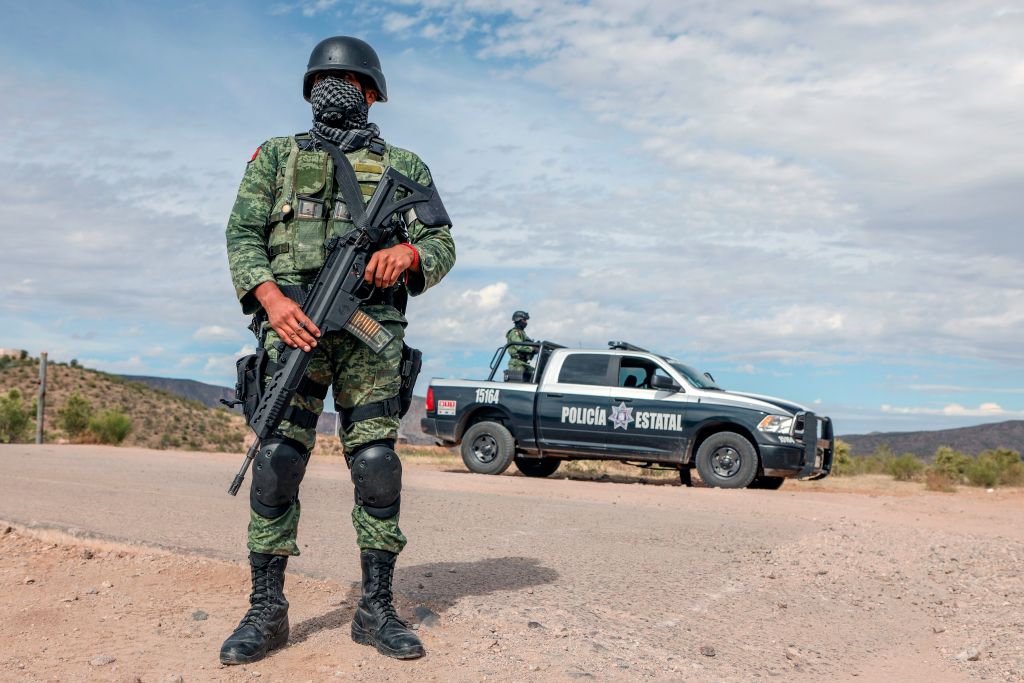Nation Building Overseas? America’s Own Neighborhood is Becoming More Violent

While American policymakers focus intently on developments in Europe, the Middle East, and the Indo-Pacific, trouble is brewing much closer to home. Under growing stress from drug-related violence and systemic corruption, Mexico is exhibiting worrisome signs of governmental dysfunction. The latest shock occurred on October 16, when U.S. authorities arrested Mexico’s former defense secretary, General Salvador Cienfuegos Zepeda, at Los Angeles International Airport on drug trafficking and money laundering charges. Cienfuegos Zepeda was a major player in Mexico’s military and political affairs, leading the country’s armed forces for six years under former president Enrique Peña Nieto (2012-2018).
His disgrace is especially important because the military has been in charge of waging the war on illegal drugs since President Felipe Calderon made it the lead agency for that mission in 2006. Allegations that Cienfuegos Zepeda was on a drug cartel payroll, therefore, were especially embarrassing and demoralizing. As the Associated Press reporters Christopher Sherman and Maria Verza point out, Mexico’s reliance on its military has grown under current president Andres Manuel Lopez Obrador: “He has entrusted it with not only leading the government’s ongoing fight with drug cartels, but also with stopping rampant fuel pipeline theft, building major infrastructure projects and being the backbone of the new, ostensibly civilian, National Guard.”
Moreover, the military has long occupied a special status in Mexico’s political hierarchy. An ironclad agreement has been in place for decades that the army doesn’t interfere in politics, and civilian political leaders, including the president, do not interfere in the army’s internal operations. The appointment process for defense secretary highlights the extent of the military’s clout. In contrast to all other cabinet posts, the president does not have the latitude of making a personal choice for defense secretary; he or she chooses from a list of acceptable candidates that the generals submit.
The incident with Cienfuegos Zepeda was hardly the first time that scandal has rocked Mexico’s military and drug-fighting establishments. Genaro García Luna, who served as Mexico’s secretary of public security from 2006 to 2012 under President Calderon, was arrested last year in Texas on drug trafficking charges. U.S. prosecutors allege that he took tens of millions of dollars in bribes to protect Joaquin “El Chapo” Guzman’s Sinaloa cartel. Another notorious incident occurred even earlier. In 1996, the Mexican government appointed General Jesus Gutierrez Rebello, who had overseen military operations for the previous seven years in the narcotics-infested region of Guadalajara, to head the National Institute for the Combat of Drugs. U.S. officials hailed the appointment and how it symbolized the growing role of the country’s military in the drug war. Just months later, he was arrested for drug trafficking.
Despite such scandals, the military has remained a highly respected institution with the public. Rafael Ramos, senior Latin American affairs editor for CNN, notes that a 2017 survey by the Mexican polling firm Parametria found “that the armed forces were among the most trusted institutions in the country, a finding that had remained favorable for the military for the preceding 15 years.” Conversely, “local and federal police forces lost the trust of the Mexican people a long time ago.”
But Ramos and other observers contend that widespread disillusionment may now change that perspective. “The arrest of General Cienfuegos Zepeda has shaken not only the armed forces but also the trust Mexicans have had in the military for generations,” Ramos emphasizes.
Beyond the issue of corruption in Mexico’s military leadership, the strategy of using the military to stem either drug trafficking or the accompanying violence has failed spectacularly. Mexico’s nearly 35,000 murders (most of which were related to the drug trade) in 2019 set a new record—breaking the previous record in 2018. The first six months of 2020 saw an additional increase, despite lockdowns and other restrictions on movement imposed in response to the COVID pandemic. Mexico’s homicide rate in 2005, the year before Calderon ordered the military to launch its offensive against the cartels was 10 per 100,000 population; in 2019, the figure stood at 29.
Moreover, the cartels themselves are becoming more diverse and more powerful criminal enterprises. In addition to drug trafficking, they now get major revenue streams from extortion, oil theft, and human trafficking. With their growing power, they also are challenging the government for control of major swaths of territory in several regions of Mexico. In October 2019, cartel gunman fought pitched battles with the Mexican military in Culiacan, the capital of Sinaloa state, and forced the army to capitulate.
Mexico is not yet on the brink of becoming a failed state, but the level of dysfunction is already worrisome and becoming more pronounced. The Trump administration’s much-touted diplomatic achievements in Afghanistan and the Middle East won’t mean much if the violence and turmoil on America’s own southern border continues to escalate. U.S. leaders not only need to pay closer attention to such troubling developments in our neighborhood, they need to be willing to rethink fundamental policies, including the long-standing war on drugs and the Mexican military’s role in that strategy. Such a policy reassessment is imperative regardless of who occupies the White House after January 20, 2021.
Ted Galen Carpenter, a senior fellow in defense and foreign policy studies at the Cato Institute and a contributing editor at The American Conservative, is the author of 12 books on international affairs, including The Fire Next Door: Mexico’s Drug Violence and the Danger to America (2012) and Bad Neighbor Policy: Washington’s Futile War on Drugs in Latin America (2003).